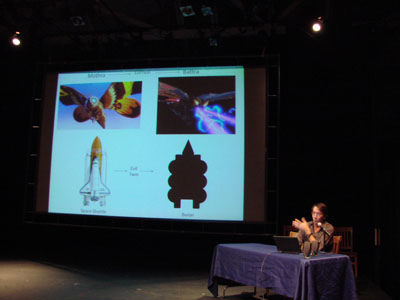This post has not been edited by the GamesBeat staff. Opinions by GamesBeat community writers do not necessarily reflect those of the staff.
Editor's note: No, Will Wright wasn't a "spectacular failure" at the recent IndieCade. Rather, Wright discussed the importance of taking risks and learning from failures (especially the big ones). I wonder what he's learned from Spore? -Jason

Will Wright gave the IndieCade keynote speech Saturday to approximately 100 people at the Ivy Substation in Culver City. With a smile, Wright displayed his first slide — an image of Indiana Jones – and claimed that he'd been severely misinformed about the purpose of IndieCade.
With great momentum and a subtle elegance, Wright spoke about the history of his own success, the importance of nonimmersive games, the power of consumer hive minds, the shortcomings of novel concepts, the potential for indie games, and even squeezed in a brief history lesson about Russian space exploration.
Later in the presentation, Wright explained that the earliest video games created were in fact indie games. Referencing Castle Wolfenstein as an early predecessor to the first-person shooter, Wright explained that the influence of one game on the industry might not be fully realized until 10 years or 12 years later.
Wrapping up his keynote, Wright constructed an analogy that's very appropriate for IndieCade.

Indie-game development is like “…you're in a magical Easter egg hunt…with landmines.” The idea Wright laid out is that indie developers are in a position to test the boundaries of game design. When you test those boundaries, you're at high risk for failure, and if you're not failing one out of every three tries, you are not trying hard enough. According to Wright, a spectacular failure should be celebrated and thought of as a valuable opportunity to learn something new.
For those of you wondering what’s next for the man behind Maxis, Will Wright said that he's been with Stupid Fun Club for only 6 months and that he would love to talk about what he's working on — but he can’t. Sorry, dudes!
